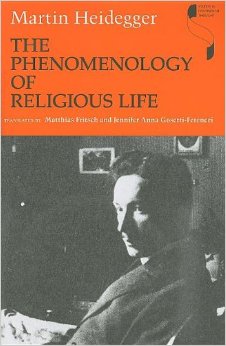Heidegger, Martin. The Phenomenology of Religious Life. Translated by Matthias Fritsch and Jennifer Anna Gosetti-Frencei. Bloomington, IN: Indiana University Press, 2004.
Excerpt:
One will say that the usual philosophy of religion also holds on to the historical, to the religious-historical. But does the formulation of the problem of the usual history of religion attain to the genuine object of religiosity itself? So long as it is not certain that the religious-historical and the genuine religious-philosophical understanding, that is, phenomenological understanding, coincide, it is still not at all said that the history of religion can deliver material for the philosophy (phenomenology) of religion. To what extent does the religious-historical material, even if only as a starting point for the philosophy of religion, come into question? That is a problem that we cannot decide here; but it is a fundamental problem, which arises for all history of ideas [Geistesgeschichte]. Today’s philosophy of history achieves nothing for positive historical research–and vice versa. It is the “merit” of Spengler to have compressed the comic effect of this situation into a philosophy. The problems of the philosophy of history are to be retrieved only out of the concrete historical sciences themselves.
Is then the material of the history of religion useable for phenomenology? In what way is the history of religion at all appropriate to its objects? One could say: If the history of religion clarifies religiosity from out of its religious environment, as [it does] out of its historical time, how can one then accuse it of not reaching its object? After all, it interprets, as objective science, free of prejudices and preconceptions, only on the basis of its material of sense that the contemporary sources offer, independently of all tendencies of the present. This argumentation has certainly an appearance of justification. On the one hand, one has to agree with it to a certain extent. But on the other hand, it must be objected that all objectivity of the science of history and the object-historical understanding offer no guarantee so long as the guiding fore-conception is not clarified.
It is to be shown, moreover, that all motives for historical understanding are always awakened through factical life experience. The science of history has only the task of employing them in formal formed-out-ness and in rigorous methodology. The tendencies of understanding arise from out of the living present, which are then merely formed out in science in “exact” methodology; the “exactness of method” offers in itself no guarantee for correct understanding. The methodical-scientific apparatus–critique of sources according to exact philological methods, etc.–can be fully intact, and still the guiding foreconception can miss the genuine object. Despite this, the modern history of religion accomplishes much for phenomenology, if it is subjected to a phenomenological destruction [Destruktion]. Only then can the history of religion be considered for phenomenology.
In this way, the history of religion accomplishes important preliminary work; at the same time, however, all of its concepts and results necessarily require phenomenological destruction. Yet this is still not a clarification of the context in which the material at hand forms the starting point for understanding. The guiding foreconception of which the historian is himself unaware–that is to say, the tendencies that already motivate the formulation of the problem–is decisive. It is often overlooked, especially in the specialized sciences, that already the formulation of the problem itself in no way offers itself out of the bare material; rather it is already foreconceptually determined. But phenomenology must alway keep its eye exactly on this problematic of the foreconception, in connection with history.
Online:
University of Bergen [pdf]
Amazon
